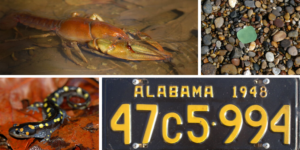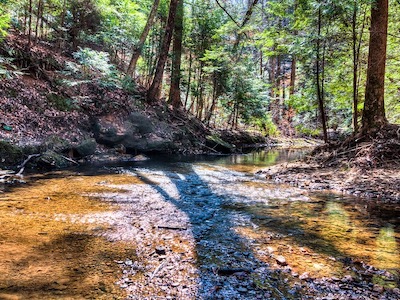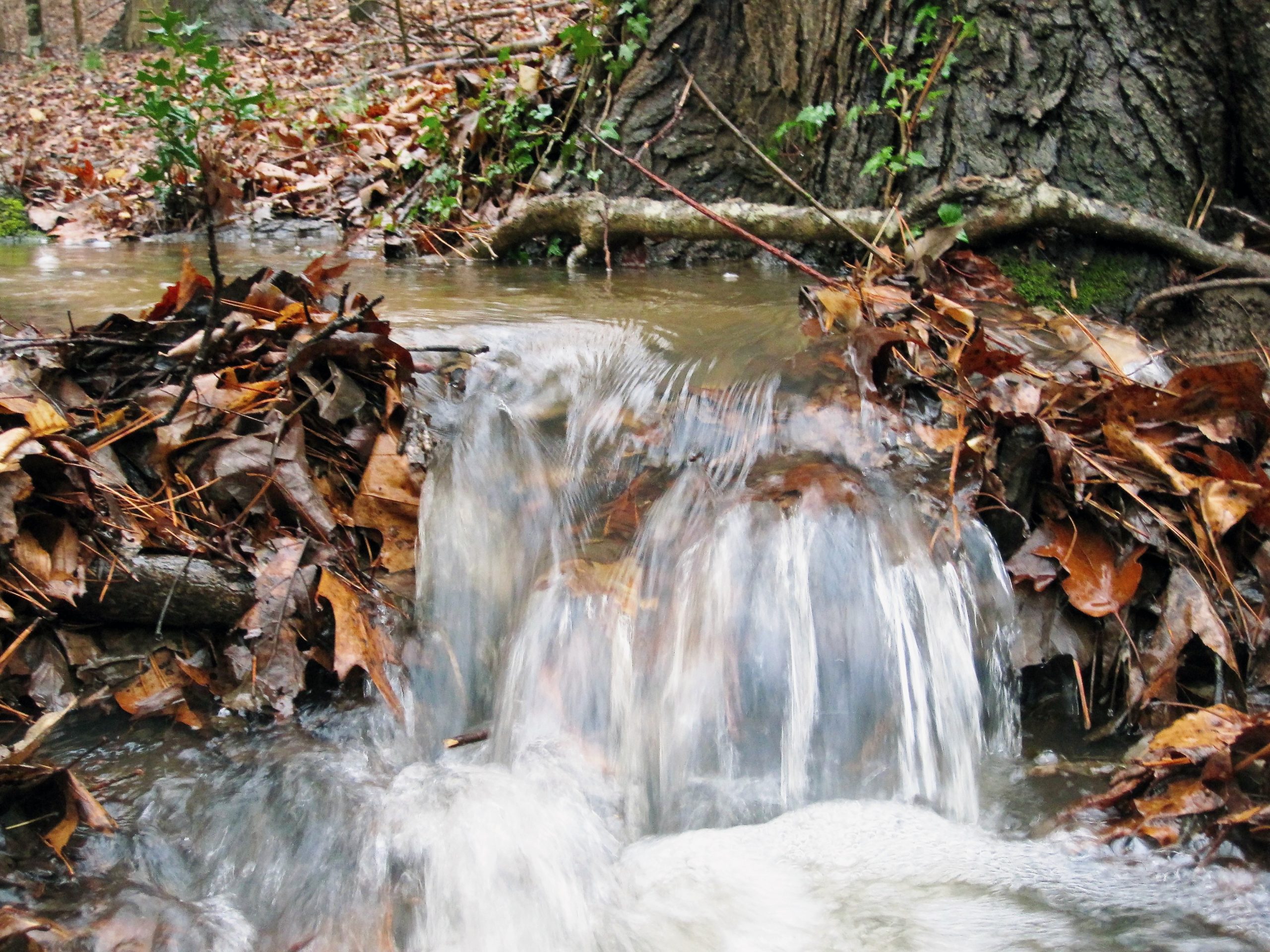ALABAMA
What Is a Mudlark?
By Daniel Wallace
Chapel Hill, NC, United States
Back in the late 60s, I was a mudlark. A mudlark is a person who looks for usable debris – trash, in other words – in the mud of a river. There are mudlarks everywhere. You may be a mudlark and not even know it.
When I was a boy there was a stream at the bottom of a shallow ravine behind my best friend Jamie’s house. I don’t know where it came from — what larger entity — or even remember wondering. Was it a mile long, or two – or a hundred? We didn’t care. All we knew is that it was just there, a stream that began in one place and ended in another and part of it went through his backyard.
Buried Treasure
It was so narrow – maybe a foot – you could jump it without having to think about it twice. I was ten years old; now I’m sixty. Hard to believe this was fifty years ago. Jamie lived not far from me, just outside of Birmingham, Alabama, where I grew up. But this stream (rivulet, runnel, rill, so many great names for tiny rivers) could be anywhere, trickling in the shadows beneath a bunch of pine trees and oak. There were places where a backlog of sticks slowed the current and created small pools of water. You could see to the bottom and the fine sandy granules of dirt.
We would spend large amounts of time here, by this stream. Much of it was spent picking up rocks and seeing what was beneath them: crawdaddies, salamanders, frogs, tadpoles. But kneeling in the mud you could find other things too. We found glass. Old Coke bottles, and the insulators on the top of electrical poles that looked like abandoned parts of alien spacecraft. Lodged between the river rocks were smaller pieces of glass, in the deepest hues of green and blue, small shards of glass worn down until their edges were as soft as a wedding ring.

Mysterious Origins
I remember finding an old fork there once, tines bent, and burnt as if in a campfire; I found some old coins —pennies from before I was even born — a bird’s bleached bones. And I also found license plates for cars, rusty metal license plates, buried in the mud or hidden beneath a pile of leaves. This was a mystery to me. How did a license plate—which was made of metal, and the length and height of a shoe box — get down here? Could it have floated in on a tide during a rainstorm when this stream became a baby river? Or was this wooded ravine a place where people came to disappear? To change their old lives by getting rid of everything that marked them as who they were? They gathered around a campfire, eating beans with this fork, playing card games with pennies, and in the morning set out into the world, never to be seen here again.
There are stories in objects, in the most random things, and this is when you know you’re a mudlark, when you see them and tell them to others.
Have a suggestion for this story? We’d love for you to submit it!


Blank
Blank
Math Resources
Learning Activities:
- The Safety of Public Water Supplies (Grades 8–10)
- The Business of Mudlarking (Middle School)
Sample Problems:
- Imagine you spent an afternoon exploring a creek near your house with two other friends. At the end of the day, you and your friends combined the loot you found. You brought six items. Together, the three of you found 15 total items. How many items did each of your friends bring? Place all the possible answers in a table and look for patterns.
- The local antiques dealer told Kwame she’d pay 50 cents for every old coin he found. How many coins does he need to find in order to buy a movie ticket?
Social Justice Questions
- In many regions, mudlarks must notify the police if they find something very costly, like a diamond ring. What do you think should be the object’s dollar amount for this notification to be mandatory?
- Have you ever seen someone use a metal detector to hunt for buried valuables? What do you think about who should be the rightful owner of an uncovered object? Would your belief change if the value of the object increased or decreased? For example, if you find $1000, can you claim it as your own? What about $100, $20, or $5?
- In Great Britain, an individual found a famous painting by Winslow Homer in a pile of junk near a garbage dump. Twenty-two years later, when Children Under the Palm was up for auction, the original owners of the painting stepped forward to claim it. Should they have a right to ownership after they allowed the painting to be thrown away? If the finder had not rescued the painting, it would have been ruined in the weather. Shouldn’t the finder receive some sort of reward? Research this controversy and decide if you agree with the outcome.
- Mudlarkers often search the Thames River shoreline for ancient treasures. Using the internet, make a list of objects that have been found there. What compensation, if any, should mudlarkers receive for their discoveries?
- In industrialized countries, large companies often release toxins into the water. What obligation do these companies have to reduce the toxins they release into the water? Do you think they should be required to clean up the contaminants they have previously released? If so, who should pay for this cleanup? If the companies do pay for the cleanup, that cost will likely be passed onto consumers who purchase their product. Is that fair?
- Toxic waste can be found in waterways around the world. Small streams become polluted by insecticide and fertilizer runoff, making it more difficult for aquatic life to thrive. Alabama ranks fifth among states in the US for industrial pollutants. Do you think states should put in place stronger restrictions to reduce toxic waste? What would the negative consequences be if a state did enact those restrictions?
Explore Further
- The author’s website so you can find out more
- Get to know a successful London mudlark
- How to apply for a permit to mudlark on the Thames
- Museum for London Docklands’ mudlark collection
- Thames Museum’s history of London mudlarks
- Mudlarking video along Brooklyn’s Dead Horse Bay
Share Your Story
Write your own Global Math Story and send it to us!
Sorry, the comment form is closed at this time.